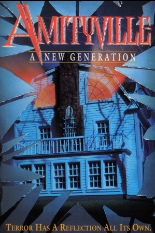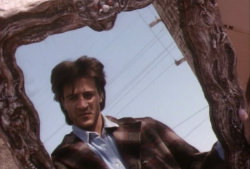
 Amityville: A New Generation, the seventh in the Amityville Horror series, takes the original film’s tagline of “For God’s sake, get out!” to heart, transferring the devilish deeds from the suburbs to the streets — to be specific, the seediest Los Angeles has to offer. There, an ornately (and garishly) framed mirror has found its way from a certain possessed house in Long Island, New York, to the cardboard abode of a hobo (Jack Orend, Aaah! Zombies!!), who gives it to Keyes (Ross Partridge, Kuffs), a struggling photographer living in the sparsely rented lofts across the street.
Amityville: A New Generation, the seventh in the Amityville Horror series, takes the original film’s tagline of “For God’s sake, get out!” to heart, transferring the devilish deeds from the suburbs to the streets — to be specific, the seediest Los Angeles has to offer. There, an ornately (and garishly) framed mirror has found its way from a certain possessed house in Long Island, New York, to the cardboard abode of a hobo (Jack Orend, Aaah! Zombies!!), who gives it to Keyes (Ross Partridge, Kuffs), a struggling photographer living in the sparsely rented lofts across the street.
Much to the dislike of his ad-exec girlfriend (Lala Sloatman, Watchers), Keyes lugs the demonic mirror into the building, where it causes all sorts of problems for his landlord (David Naughton, An American Werewolf in London), his starving-artist neighbor (Julia Nickson, Ready Player One), her boyfriend (Robert Rusler, Weird Science) and so on. Dead bodies pile up as Keyes experiences startling visions that change his behavior — not unlike James Brolin’s character in 1979’s OG Amityville Horror.
 That idea of the sins of the father bubbles to prominence, revealing A New Generation to have more on its mind than mining quick-buck rental dollars. While lesser filmmakers would treat the material as trash, director John Murlowski (Santa with Muscles) and his DP, eventual Oscar winner Wally Pfister (Inception), bring some class to it, pulling off some ingenious shots and in-camera effects as creative as the story’s protagonists. Returning as screenwriters from the previous year’s Amityville 1992: It’s About Time, Christopher DeFaria and Antonio Toro actually make viewers care about Keyes, as does the Dermot Mulroney-esque Partridge, of course, by committing to a performance instead of just cashing a paycheck.
That idea of the sins of the father bubbles to prominence, revealing A New Generation to have more on its mind than mining quick-buck rental dollars. While lesser filmmakers would treat the material as trash, director John Murlowski (Santa with Muscles) and his DP, eventual Oscar winner Wally Pfister (Inception), bring some class to it, pulling off some ingenious shots and in-camera effects as creative as the story’s protagonists. Returning as screenwriters from the previous year’s Amityville 1992: It’s About Time, Christopher DeFaria and Antonio Toro actually make viewers care about Keyes, as does the Dermot Mulroney-esque Partridge, of course, by committing to a performance instead of just cashing a paycheck.
Partridge’s goodwill extends to others around him, including Terry O’Quinn (1987’s The Stepfather) as the investigating detective, Lin Shaye (Insidious) as a nurse and Richard Roundtree (Shaft himself) as a fellow tenant. That a sixth sequel would boast such relative star power is as surprising as the quality of the film itself. —Rod Lott
